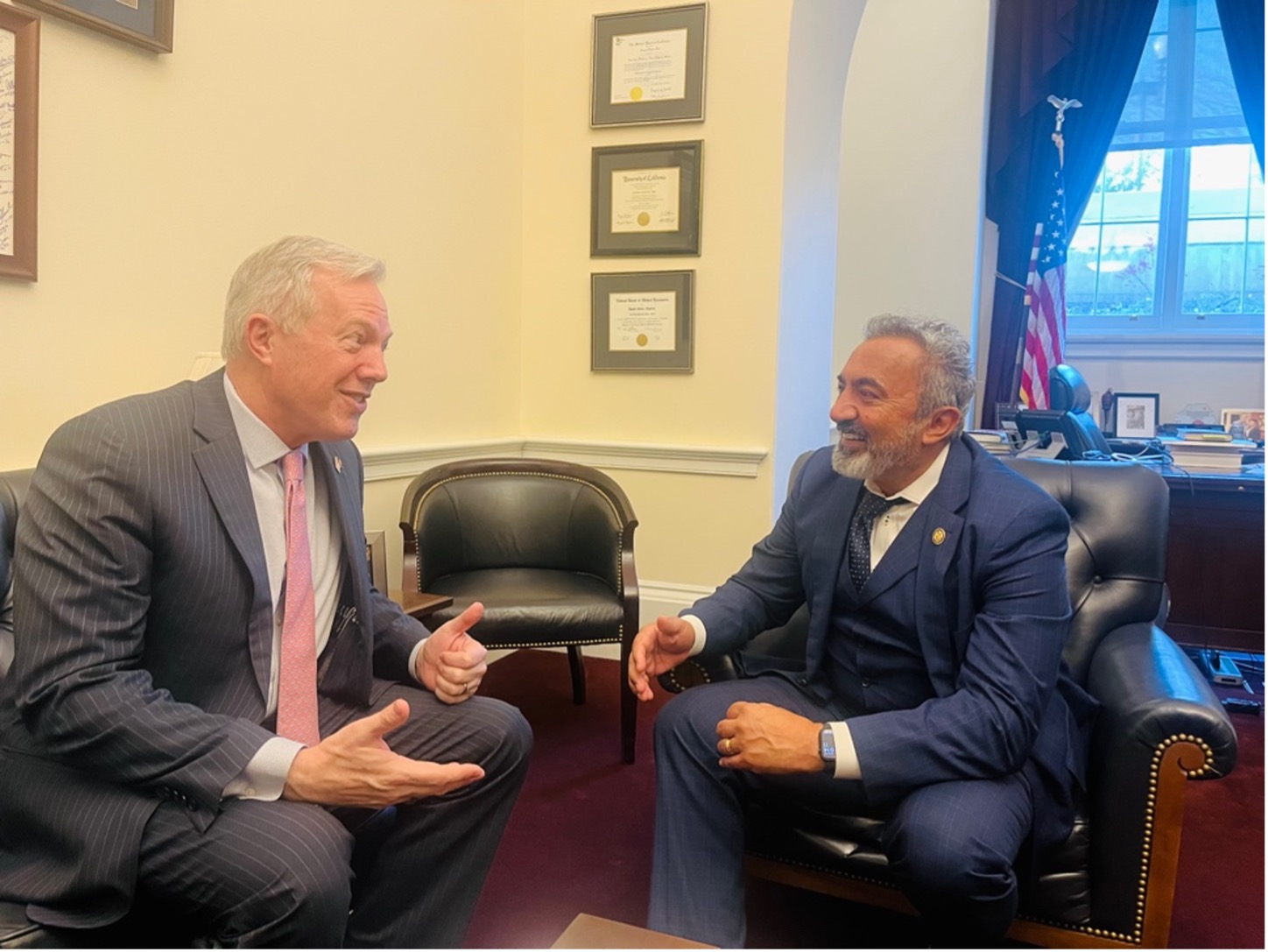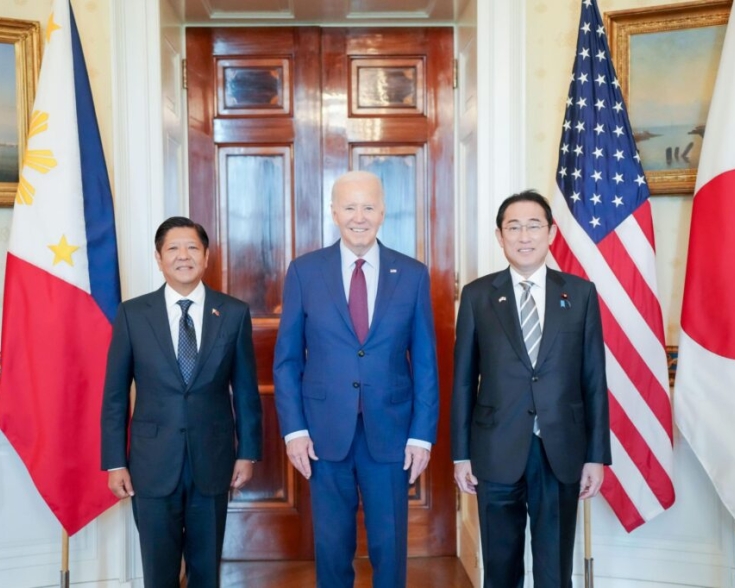Rep. Ami Bera Interview

On March 11, USABC President and CEO Ambassador Ted Osius (ret.) had the pleasure of sitting down with Congressman Ami Bera, M.D. for an exclusive interview. Congressman Bera has represented Sacramento County in the U.S. House of Representatives since 2013. He is currently a member of the House Foreign Affairs Committee, where he serves as Ranking Member of the Subcommittee on East Asia and the Pacific. He is also Co-Chair of the ASEAN Caucus.
In Ambassador Osius and Congressman Bera’s wide-ranging conversation, the pair discusses the current administration’s trade policy; new avenues for collaboration between U.S. businesses and ASEAN; and the rapidly evolving relationships between the United States, China, and Southeast Asia. Congressman Bera shares his thoughts on tariffs, semiconductors, and digital trade, as well as expressing his optimism for the role that the energy sector will play in U.S.-ASEAN economic relations.
The following interview has been condensed and edited for clarity. The views expressed herein do not necessarily represent those of the US-ASEAN Business Council.
Transcript of Interview:
Ambassador Ted Osius
Last week, the U.S. Trade Representative published the 2025 Trade Policy Agenda. How do you foresee certain aspects of the new administration's trade policy, such as the threat of tariffs, impacting U.S.-ASEAN economic ties?
Representative Ami Bera
Thus far, I haven't seen a lot that has targeted ASEAN per se, but I think the whole conversation around tariffs is creating a lot of uncertainty. Markets like certainty and predictability.
Reciprocal tariffs will certainly impact some Southeast Asian nations. On the flip side, there are things in the digital trade area—some of the digital trade chapter out of USMCA or the U.S.-Japan Digital Trade Agreement—that could be positive for ASEAN.
Another thing that we worry about, less specific to trade, is the redeployment of Coast Guard vessels. We think some of what we've been doing in South China Sea, in terms of Coast Guard, has been very beneficial for Vietnam and the Philippines. If we’re redeploying assets to the Western Hemisphere, I think that leaves some holes and vacancies.
Ambassador Ted Osius
I'm going to Vietnam in a few days, and I'm going to urge them to be proactive. Don't wait until the tariffs hit you.
Representative Ami Bera
Take lessons from the Japanese, who have been pretty good about it. Abe, certainly in Trump’s first term, was very proactive. I think Ishiba has taken very good proactive steps. Even though India's situation is very different from some Southeast Asian nations, Modi visiting and proactively having conversations has been the right thing to do.
Ambassador Ted Osius
The trade minister of Vietnam is here right now, having conversations about deals. The Thai trade minister was here just a little bit earlier. Everybody's coming and looking to see what can be done.
Representative Ami Bera
You don't want to get caught in the crosshairs.
Ambassador Ted Osius
You don't. So how can ASEAN countries and U.S. companies best respond and react to these new policies?
Representative Ami Bera
I think there are some real opportunities. The president is clear that he wants “America First” to build resiliency and prosperity. So where are some vulnerabilities? We talked about critical minerals. There’s a real reliance on China and a real vulnerability there. If the goal is to isolate China—as much as we'd like to say that some of that is going to come back to the United States, it’s probably not a lot, just because of the refining and everything else. But I think strategically, there's a lot that we can do in places like Vietnam and Malaysia.
How do we work with our closest allies, as well? Australia, New Zealand, and Japan already make a lot of investments in Southeast Asia. We can leverage those investments and build redundant supply chains where they make sense.
It's going to be very interesting to see how China responds. Some of us think Trump will cut a deal with Xi Jinping. Some say he's moving to isolate China. I don't know which one it is. I think I know where Waltz and Rubio stand on this, but clearly, they're taking direction from President Trump.
If I were advising Southeast Asian nations, it does look as though there's targeted retaliation towards American farmers in specific states. I think they've gotten a lot more strategic in what reciprocal tariffs they're targeting, where it might make sense for a Vietnam or Thailand—if there are specific products—to say: “You know, we'd love to get some soybeans.”
Ambassador Ted Osius
Soybeans are a California product.
Representative Ami Bera
They are. And Trump is clearly looking at energy, and he talks about “Drill, baby, drill.” There’s obviously a real need for LNG in Southeast Asia. ASEAN countries could approach the president and say, “Hey, we would love to buy American energy.”
Ambassador Ted Osius
They could buy some of their LNG from the United States instead of from Gulf countries.
Representative Ami Bera
Again, the President wants to cut deals.
Ambassador Ted Osius
And it ties us together strategically, so there are benefits beyond the commercial. And it’s cleaner than coal.
Representative Ami Bera
It is. Obviously, many of these countries have potential energy reserves in their territorial waters. For a country like Vietnam, that's a point of contention with the Chinese in the South China Sea. But again, perhaps strategically inviting American companies to come in and say, “We'd love to do some exploration”—it’s a provocative move.
Ambassador Ted Osius
But if you have to choose between us or a Malaysian or French partner, well, we come along with a little more strength.
Representative Ami Bera
I think so. And then it puts our companies in the game. Again, it's a provocative move, but they could certainly think about things like that.
Ambassador Ted Osius
As well as Boeing aircraft and Lockheed.
How can a proactive U.S. trade agenda be pursued using the tools and opportunities currently available to Congress?
Representative Ami Bera
We don't have Trade Promotion Authority right now. It would be interesting if Trump were to ask for TPA and see how the majority would respond. It'll also be interesting to see how he approaches USMCA next year. We know that Trump is sensitive to what happens in the markets—we've seen in the last couple days that more markets have gone.
Since we’re out of power, I think the majority will probably take its cues from where the president is on this. I'd love to say we could do a digital trade deal; I think there's still an appetite to do something in the digital realm. The president has surrounded himself with a lot of tech-savvy individuals who I think would be supportive of that as well.
Ambassador Ted Osius
Opportunities in the digital realm are huge. Speaking of that, the Indo-Pacific Economic Framework is behind us, but ASEAN is negotiating a Digital Economy Framework Agreement. Could that be helpful going forward?
Representative Ami Bera
I think it could. We have some internal things that we have to do in terms of data privacy. As opposed to California doing its own thing, we need to do this at the federal level, which would make it easier for us to participate. But we've got the digital chapter in the USMCA and a bilateral agreement with Japan. So there's plenty of work to which we could point the president and say, “These are your legacy items, right? Let's take some of those legacy items and expand them.”
Ambassador Ted Osius
Could there be a USMCA for the Indo-Pacific?
Representative Ami Bera
I'm always an optimist, but that’s a tougher one right now. This is an unpredictable time. Could you see it in six months? Could you see it in 12 months, after the roller coaster of tariffs, no-tariffs, tariffs, no-tariffs? USMCA renegotiations are coming up, so what does that look like?
Ambassador Ted Osius
And Congress will play a role?
Representative Ami Bera
We should.
Ambassador Ted Osius
What avenues for collaboration with either the U.S. government or ASEAN governments can the U.S. private sector pursue to deepen trade ties with Southeast Asia?
Representative Ami Bera
Obviously, there's a lot of private sector investment that's going into Southeast Asia from our companies. I think we would love to continue to see that investment.
I'm watching what's playing out with China. Does it really make sense to have all the older, lower-end semiconductors come back to the United States? That's not where the battlefield is.
Ambassador Ted Osius
The semiconductors that are used in vacuum cleaners are very different from the ones used in F-35s.
Representative Ami Bera
It’s very different from the high-end stuff. I probably wouldn’t have gotten into this tit-for-tat on the lower-end stuff, but that’s certainly an opportunity to say, “Okay, if we're not going to do it in China, where are we going to do it? Can you help set up some of these industries?” And, again, Vietnam is perfectly situated for some of this.
Ambassador Ted Osius
And of course, Malaysia already has the infrastructure. The Philippines and Indonesia are other options.
In which sectors does U.S. industry have a competitive advantage, and how should companies leverage this advantage in Southeast Asia?
Representative Ami Bera
I would look at energy. That is clearly part of the president’s agenda. Southeast Asian nations need LNG and so forth. If those exports from the United States are going to increase, this is a way to do so. President Trump is sensitive to trade imbalances. This is a way to say, “Hey, we're going to import more of our energy and move away from the Gulf. And we’ll import more American energy.”
Again, we're sitting tight. We think there are going to be opportunities in three months, six months, two years. President Trump, if nothing else, is unpredictable. What he's feeling today may be different from what he's feeling six or 12 months from now. We have to think about those opportunities and maintain our relationships. I do think Congress has a real role in maintaining those relationships, both Democrats and Republicans.
Thank you for doing what you're doing.
Ambassador Ted Osius
It's our pleasure and honor. You have many fans on this side, and we like it when we can highlight the ideas of thoughtful people.
Representative Ami Bera
Fantastic.







